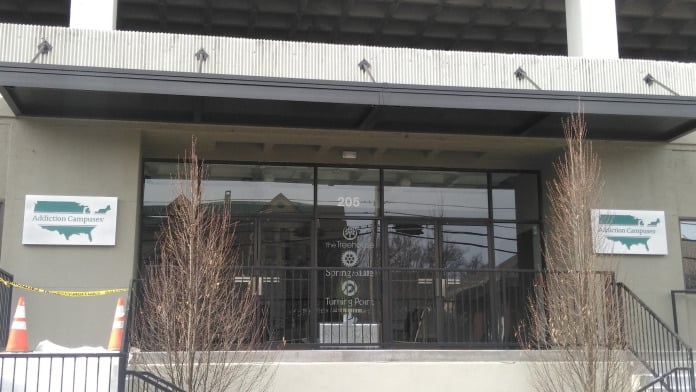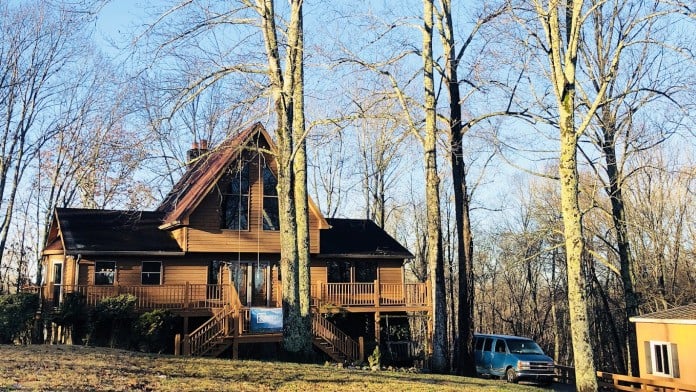Explore a comprehensive guide to 22 inpatient, 20 outpatient, and 18 detox centers across Tennessee. Compare costs, reviews, and treatment options to find the perfect rehab facility for your needs.

 | Addiction CampusesAddiction Campuses, located in Nashville, TN, offers comprehensive addiction treatment services tailored to support individuals on their path to recovery. Our facility provides a range of programs, including detoxification, residential treatment, outpatient services, and aftercare support, all designed to meet the unique needs of each client. At Addiction Campuses, we focus on creating a compassionate and safe environment where individuals can address the underlying issues of their addiction and develop essential coping skills for long-term success. Our dedicated team of professionals is committed to empowering clients on their journey toward a healthier, more fulfilling life. Contact us today to learn more about our services and how we can assist you or your loved ones in achieving lasting recovery. 205 Reidhurst Ave, Nashville, TN 37203 | Levels of Care:DetoxInpatientoutpatient Payment Options:Medicaid Private insurance Self-Pay Options Financial Aid Medicare Military Insurance | ||
 | Addiction Campuses of TennesseeAddiction Campuses of Tennessee, located at 707 N Maple St, Murfreesboro, TN 37128, offers comprehensive treatment solutions for individuals battling addiction. The facility provides a wide range of services, including detoxification, residential treatment, outpatient programs, and aftercare support, all tailored to the unique needs of each client. With a compassionate and experienced team, Addiction Campuses focuses on evidence-based therapies combined with holistic approaches to foster healing and personal growth. Discover a supportive environment that empowers individuals to reclaim their lives and embark on a journey toward lasting recovery at Addiction Campuses of Tennessee. 707 N Maple St, Murfreesboro, TN 37128 | Levels of Care:DetoxInpatientoutpatient Payment Options:Private Insurance Self-Pay Options | ||
Alliance Healthcare ServicesAlliance Healthcare Services | Payment Options:Self-pay options | |||
Alliance Healthcare Services - 2100 Whitney AvenueAlliance Healthcare Services - 2100 Whitney Avenue | Payment Options:Self-pay options | |||
Alliance Healthcare Services - Douglass AvenueAlliance Healthcare Services - Douglass Avenue | Payment Options:Self-pay options | |||
Alliance Healthcare Services - Summer AvenueAlliance Healthcare Services - Summer Avenue | Payment Options:Self-pay options | |||
Alliance Healthcare Services - Winchester RoadAlliance Healthcare Services - Winchester Road | Payment Options:Self-pay options | |||
Alternative CounselingAlternative Counseling | Payment Options:Self-pay options | |||
Alternative CounselingAlternative Counseling | Payment Options:Medicaid | |||
Ameri Kare Mental HealthAmeri Kare Mental Health | Payment Options:Medicaid | |||
AppleGate RecoveryAppleGate Recovery | Payment Options:Self-pay options | |||
Aspell Recovery - Hardin CountyAspell Recovery - Hardin County | Payment Options:Medicaid | |||
Aspell Recovery CenterAspell Recovery Center | Payment Options:Self-pay options | |||
Baptist Memorial Hospital - Union CityBaptist Memorial Hospital - Union City | Payment Options:Self-pay options | |||
Baptist Rehabilitation - OutpatientBaptist Rehabilitation - Outpatient | Payment Options:Self-pay options | |||
Behavioral Health and Wellness ClinicBehavioral Health and Wellness Clinic | Payment Options:Medicaid | |||
Behavioral Health GroupBehavioral Health Group | Payment Options:Self-pay options | |||
Behavioral Health GroupBehavioral Health Group | Payment Options:Self-pay options | |||
Behavioral Health Group - Bernard AvenueBehavioral Health Group - Bernard Avenue | Payment Options:Self-pay options | |||
Behavioral Health Group - Citico StreetBehavioral Health Group - Citico Street | Payment Options:Self-pay options |
Find Tennessee drug rehabs in cities near you or sort by letter.
For anyone seeking help for addiction for themselves or a loved one calls to Addiction Helpline America are completely confidential and available 24/7.
Please note: any treatment center listed on our site that receives calls is a paid advertiser.
Calls to a specific treatment center’s listing will be connected directly to that center.
Calls to our general helpline will be answered by treatment providers, all of whom are paid advertisers.
By calling the helpline, you agree to our terms and conditions. These calls are free of charge and carry no obligation to enter treatment. Neither Sober Steps nor anyone answering your call receives a commission or fee based on your choice of treatment provider.
If you’d like to explore additional treatment options or connect with a specific rehab center, you can browse our top-rated listings, visit our homepage, or call us at (844) 561-0606. You may also contact us for further assistance.
Calls to any general helpline will be answered or returned by one of the treatment providers listed, each of which is a paid advertiser:
Our helpline is available 24 hours a day, 7 days a week at no cost to you and with no obligation for you to enter into treatment. We are committed to providing support and guidance whenever you need it.
In some cases, Addiction Helpline America charges our verified partner a modest cost per call. This fee helps us cover the costs of building and maintaining our website, ensuring that we can continue to offer this valuable service to those in need.